Choosing The Best Finch Nest: A Comprehensive Guide
Discover step by step on what to look for when choosing a finch nest and why some nests might not be the best option for your birds.
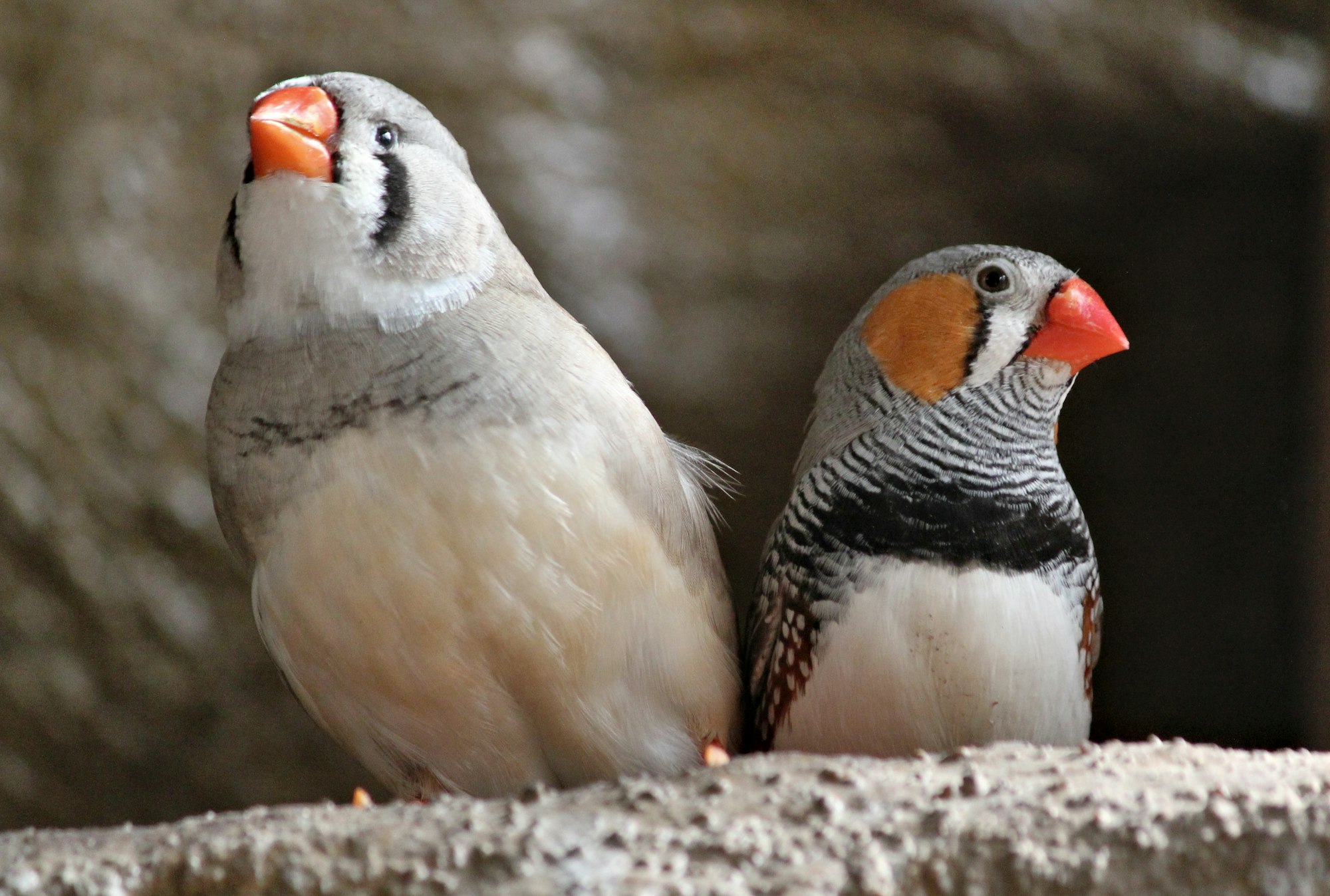
Key Takeaways:
- Understanding the nesting habits and preferences of finches is crucial for providing the best environment.
- Different types of nests cater to various species and their unique needs.
- Proper placement and maintenance of nests can significantly impact the health and happiness of your finches.
Introduction
Finches are delightful little birds that bring joy and color to any environment. Whether you're a seasoned bird enthusiast or a beginner, understanding how to choose the best nest for your finches is essential. This guide will walk you through everything you need to know about finch nests, from types and materials to placement and maintenance.
Understanding Finch Nesting Habits
Finches are known for their diverse nesting habits. They can build nests in a variety of locations, including deciduous and coniferous trees, hanging planters, and even rock ledges. House finches, for example, are particularly adaptable and can nest in buildings, feeders, and other man-made structures.
House finches feed primarily on the ground, at feeders, or in fruiting trees, and they are rarely solitary except during the breeding season, often forming large flocks.
During the nesting season, which typically begins in January in the USA, finches become more active in seeking out suitable nesting sites. Female finches are usually responsible for building the nest, while males assist by gathering nesting material. Understanding these habits can help you provide the best environment for your finches.
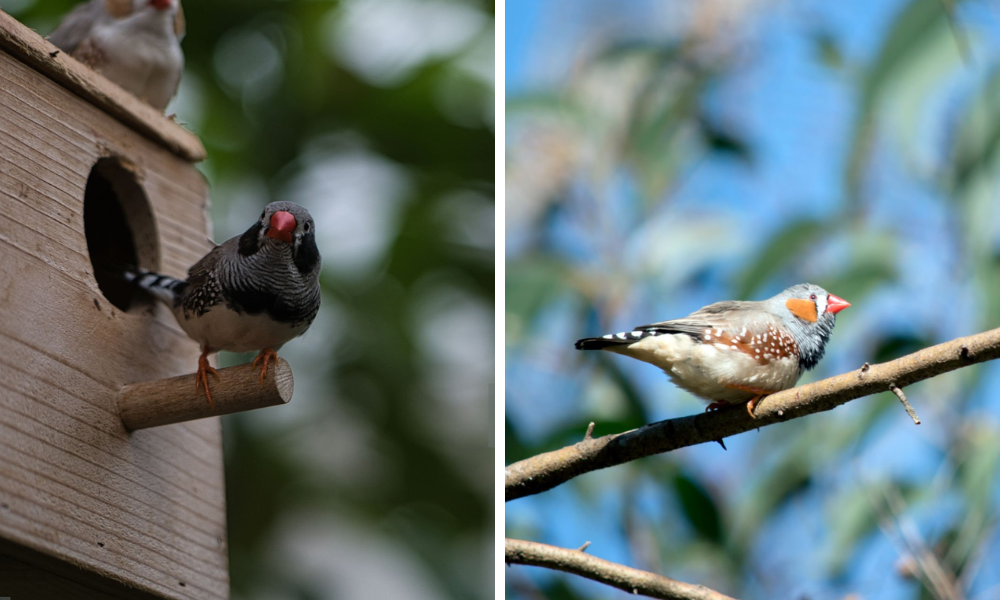
Types of Finch Nests
There are several types of nests that finches may use, each catering to different species and their unique needs. Commonly, finches prefer nests made from natural materials like twigs, leaves, and feathers. However, some species may also use plastic or wool to line their nests.
Using a nest box can be beneficial for finches, providing them with a secure place to build their nests. It's important to provide appropriate nesting materials and be aware of potential issues, such as birds overstuffing the nest box or problems related to its design and materials.
Ground nesting finches, such as those found in chaparral regions, often build their nests on the ground, using materials like grass and leaves. On the other hand, tree-nesting finches prefer elevated sites in deciduous or coniferous trees. Understanding the specific needs of your finch species will help you choose the best nest.
Nest Materials
The nesting material used in finch nests can vary widely. Common materials include twigs, leaves, feathers, and even string. House finches, for example, often use a combination of twigs and feathers to create a comfortable and secure nest for their young.
The eggs of house finches are typically pale blue with distinctive black and lavender dots, primarily located at the larger end.
It’s important to provide a variety of materials for your finches to choose from. This not only helps them build a sturdy nest but also keeps them engaged and happy. You can place these materials in feeders or around your yard to encourage natural nesting behaviors.
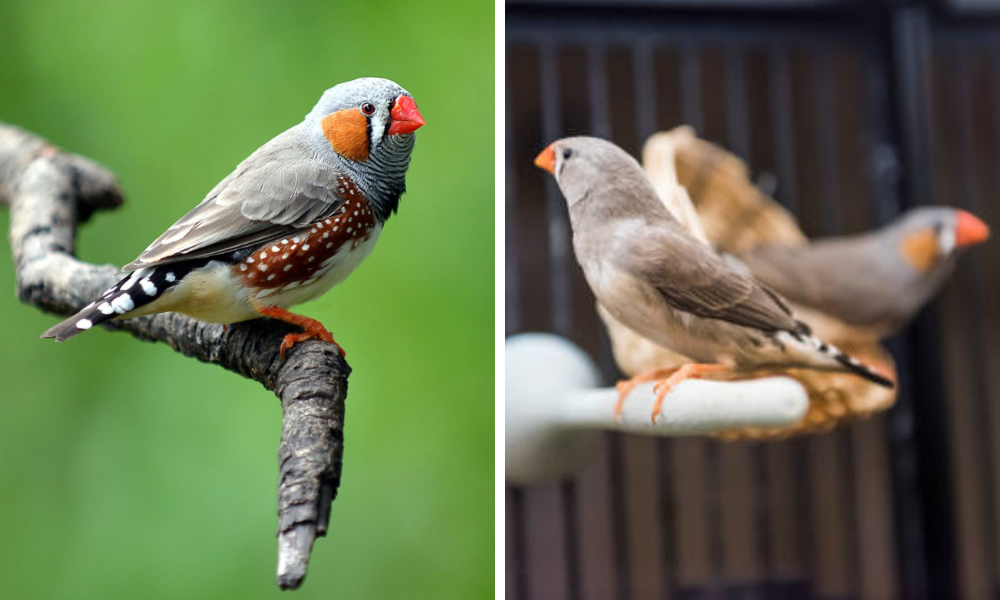
Criteria For Selecting Nesting Materials
When it comes to selecting nesting materials for your finches, it’s essential to consider a few key factors to ensure their comfort and successful breeding. Finches prefer natural materials that mimic their natural habitat. Here are some criteria to keep in mind:
- Natural Origin: Finches thrive with materials like plant fibers, twigs, and leaves. These natural elements provide a familiar and comfortable environment for their nests.
- Softness and Durability: The materials should be soft enough for finches to manipulate and shape into a nest, yet durable enough to withstand the elements and support the nest’s structure.
- Non-Toxicity: Avoid synthetic materials such as plastics and metals, which can be harmful to finches and their young. Natural materials are safer and more suitable for their delicate needs.
- Ease of Handling: Finches have small beaks and feet, so the materials should be easy for them to carry and manipulate. Lightweight and flexible materials are ideal.
- Availability: Choose materials that are readily available and easy to obtain, such as dried grasses, twigs, and leaves. This ensures that your finches have a consistent supply for nest building.
Top 5 Nesting Materials For Finches
Based on the criteria above, here are the top five nesting materials that finches love:
- Dried Grasses: Finches adore dried grasses, which provide a natural and comfortable material for their nests. These grasses are easy to find and perfect for creating a cozy nest.
- Twigs: Thin twigs are ideal for finches to use as a framework for their nests. They provide structure and support, helping to form a sturdy base.
- Plant Fibers: Plant fibers, such as coconut fiber or cotton, are soft and durable, making them an excellent choice for finch nests. These fibers are easy to handle and shape.
- Leaves: Large leaves from deciduous trees offer a natural and comfortable material for finches to incorporate into their nests. They add an extra layer of insulation and comfort.
- Feathers: Finches often use feathers to line their nests, providing a soft and warm environment for their young. Feathers are lightweight and easy for finches to carry.
Nest Placement
Proper placement of finch nests, including the use of a nest box, is crucial for the health and safety of your birds. Nests should be placed in a location that is safe from predators and harsh weather conditions. For tree-nesting finches, placing nests in deciduous or coniferous trees can provide the necessary protection and elevation.
Hanging planters and other elevated structures can also be used to place nests. Ensure that the nests are securely attached and not easily accessible to predators. This will help keep your finches and their young safe during the breeding season.
Choosing The Right Nesting Box
Selecting the right nesting box for your finches is crucial for their comfort and safety. Here are some tips to help you choose the best nesting box:
- Size: Finches prefer nesting boxes with a small entrance hole, about 2.5-3 inches in diameter, and a depth of around 6-8 inches. This size provides a cozy and secure space for them.
- Material: Opt for a nesting box made from natural materials like wood or bamboo. These materials offer a comfortable and familiar environment for finches.
- Ventilation: Ensure the nesting box has adequate ventilation to prevent moisture buildup and keep the finches cool. Proper airflow is essential for a healthy nesting environment.
- Easy Cleaning: Choose a nesting box with a removable roof or back panel for easy cleaning and maintenance. This feature allows you to keep the nest clean and free from parasites.
- Mounting: Mount the nesting box in a location that receives partial shade and is protected from strong winds and predators. A well-placed nesting box ensures the safety and comfort of your finches.
House Finch Nesting Preferences
House finches are known for their adaptability, but they do have specific nesting preferences. Here are some interesting facts about their nesting habits:
- Nesting Sites: House finches prefer to nest in deciduous and coniferous trees, as well as in urban areas like buildings and hanging planters. Their adaptability allows them to thrive in various environments.
- Nest Height: They typically nest at a height of around 12-15 feet above the ground. This elevation provides safety from ground predators and a good vantage point.
- Nest Material: House finches use a variety of materials, including grasses, twigs, leaves, and feathers, to build their nests. They are resourceful and make use of what is available.
- Abandoned Nests: House finches will often use abandoned nests of other birds, such as sparrows or wrens. This behavior saves them time and energy in building a new nest.
- Breeding Season: House finches breed from March to August, with the peak breeding season occurring in May and June. During this time, they are most active in nest building and raising their young.
Nest Maintenance
Maintaining finch nests is essential for the well-being of your birds. Regularly check the nests for any signs of damage or wear and tear. Remove any abandoned nests to prevent the spread of diseases and parasites. Disturbances from other birds are a common cause for abandoned nests, emphasizing the importance of regular nest checks and maintenance.
It’s also important to clean the nesting area regularly. This includes removing any old or soiled materials and replacing them with fresh ones. Keeping the nesting area clean and well-maintained will help ensure the health and happiness of your finches.
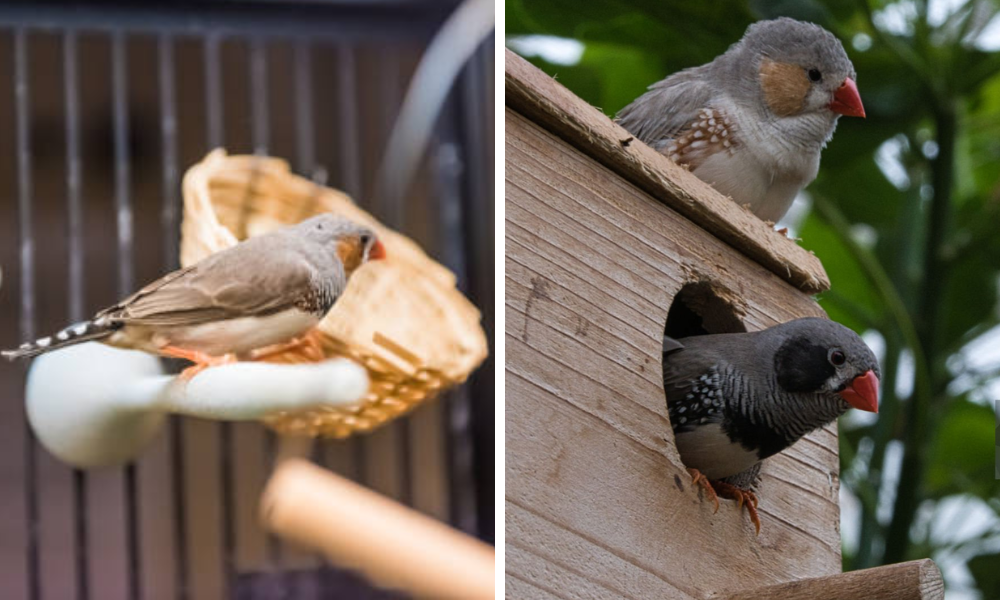
Breeding Season
The breeding season for finches typically begins in January and can last several months. During this time, finches become more active in courtship and nesting behaviors. Male finches often display vibrant colors and perform elaborate courtship rituals to attract females.
Providing a suitable nesting environment during the breeding season is crucial for the success of your finches. Ensure that there are plenty of nesting materials available and that the nests are placed in safe and secure locations.
Nesting Behavior
Finches exhibit a variety of nesting behaviors, depending on their species and environment. House finches, for example, are known for their adaptability and can nest in a wide range of locations, from trees to buildings.
The house finch is highly social, often forming large flocks, and is known for its adaptability in various environments.
Understanding the specific nesting behaviors of your finch species can help you provide the best environment for them. This includes providing the right materials, placement, and maintenance for their nests.
Nesting Sites
Finches can nest in a variety of sites, including deciduous and coniferous trees, hanging planters, and rock ledges. House finches are particularly adaptable and can nest in buildings, feeders, and other man-made structures.
Choosing the right nesting site for your finches is crucial for their health and safety. Ensure that the site is safe from predators and harsh weather conditions, and provide plenty of nesting materials to encourage natural behaviors.
Nesting Materials
Providing appropriate nesting material is essential for the health and happiness of your finches. Common materials include twigs, leaves, feathers, and string. House finches, for example, often use a combination of twigs and feathers to create a comfortable and secure nest for their young.
You can place these materials in feeders or around your yard to encourage natural nesting behaviors. This not only helps your finches build a sturdy nest but also keeps them engaged and happy.
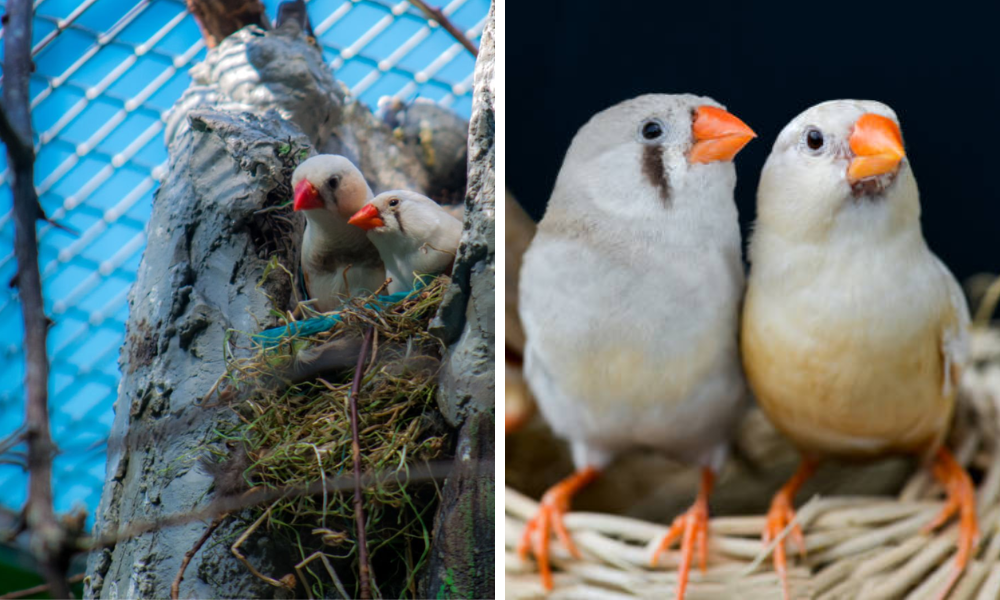
Nesting Season
The nesting season for finches typically begins in January and can last several months. During this time, finches become more active in courtship and nesting behaviors. Male finches often display vibrant colors and perform elaborate courtship rituals to attract females.
Providing a suitable nesting environment during the nesting season is crucial for the success of your finches. Ensure that there are plenty of nesting materials available and that the nests are placed in safe and secure locations.
Nesting Habits
Finches exhibit a variety of nesting habits, depending on their species and environment. House finches, for example, are known for their adaptability and can nest in a wide range of locations, from trees to buildings.
Understanding the specific nesting habits of your finch species can help you provide the best environment for them. This includes providing the right materials, placement, and maintenance for their nests.
Nesting Preferences
Different finch species have different nesting preferences. Some prefer to nest in deciduous or coniferous trees, while others may choose hanging planters or rock ledges. House finches are particularly adaptable and can nest in a variety of locations.
Understanding the nesting preferences of your finch species can help you choose the best nest for them. This includes providing the right materials, placement, and maintenance for their nests.
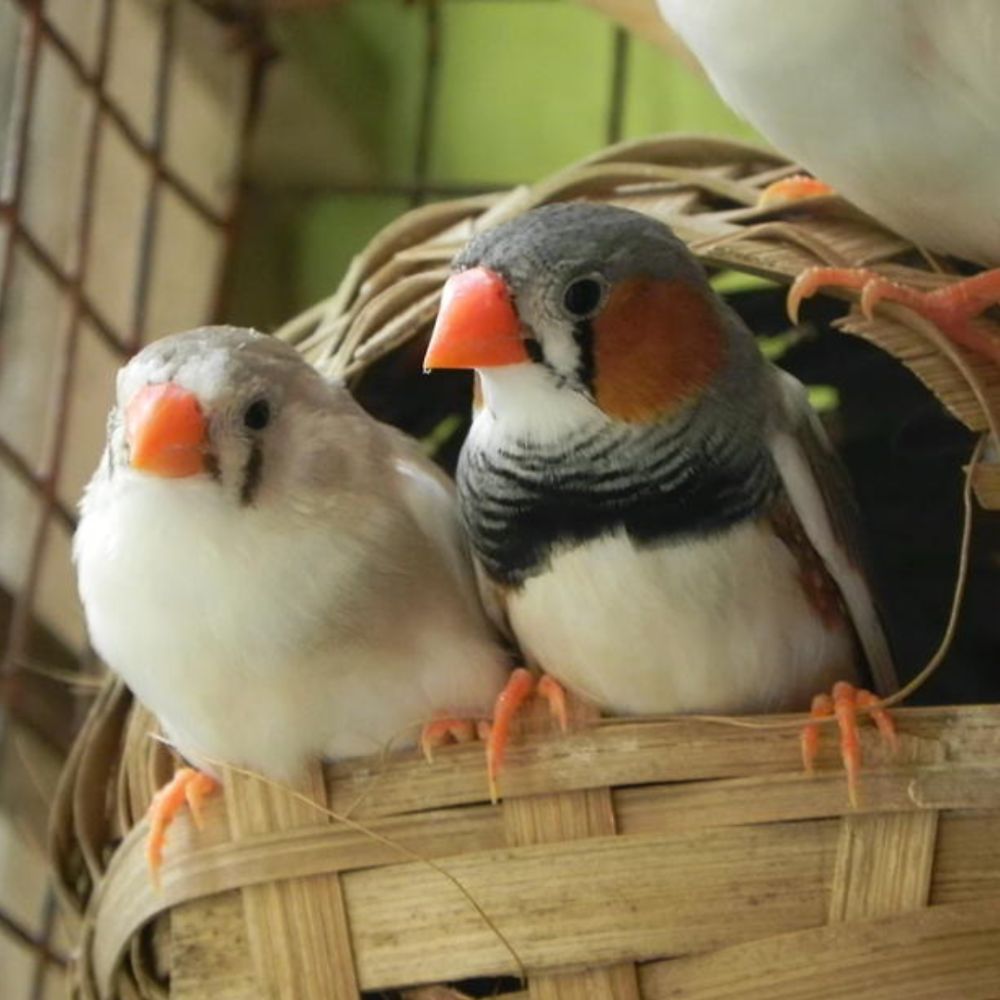
Nesting Behavior
Finches exhibit a variety of nesting behaviors, depending on their species and environment. House finches, for example, are known for their adaptability and can nest in a wide range of locations, from trees to buildings.
Understanding the specific nesting behaviors of your finch species can help you provide the best environment for them. This includes providing the right materials, placement, and maintenance for their nests.
Nesting Sites
Finches can nest in a variety of sites, including deciduous and coniferous trees, hanging planters, and rock ledges. House finches are particularly adaptable and can nest in buildings, feeders, and other man-made structures.
Choosing the right nesting site for your finches is crucial for their health and safety. Ensure that the site is safe from predators and harsh weather conditions, and provide plenty of nesting materials to encourage natural behaviors.
Nesting Materials
Providing a variety of nesting materials is essential for the health and happiness of your finches. Common materials include twigs, leaves, feathers, and string. House finches, for example, often use a combination of twigs and feathers to create a comfortable and secure nest for their young.
You can place these materials in feeders or around your yard to encourage natural nesting behaviors. This not only helps your finches build a sturdy nest but also keeps them engaged and happy.
Nesting Season
The nesting season for finches typically begins in January and can last several months. During this time, finches become more active in courtship and nesting behaviors. Male finches often display vibrant colors and perform elaborate courtship rituals to attract females.
Providing a suitable nesting environment during the nesting season is crucial for the success of your finches. Ensure that there are plenty of nesting materials available and that the nests are placed in safe and secure locations.
Nesting Habits
Finches exhibit a variety of nesting habits, depending on their species and environment. House finches, for example, are known for their adaptability and can nest in a wide range of locations, from trees to buildings.
Understanding the specific nesting habits of your finch species can help you provide the best environment for them. This includes providing the right materials, placement, and maintenance for their nests.
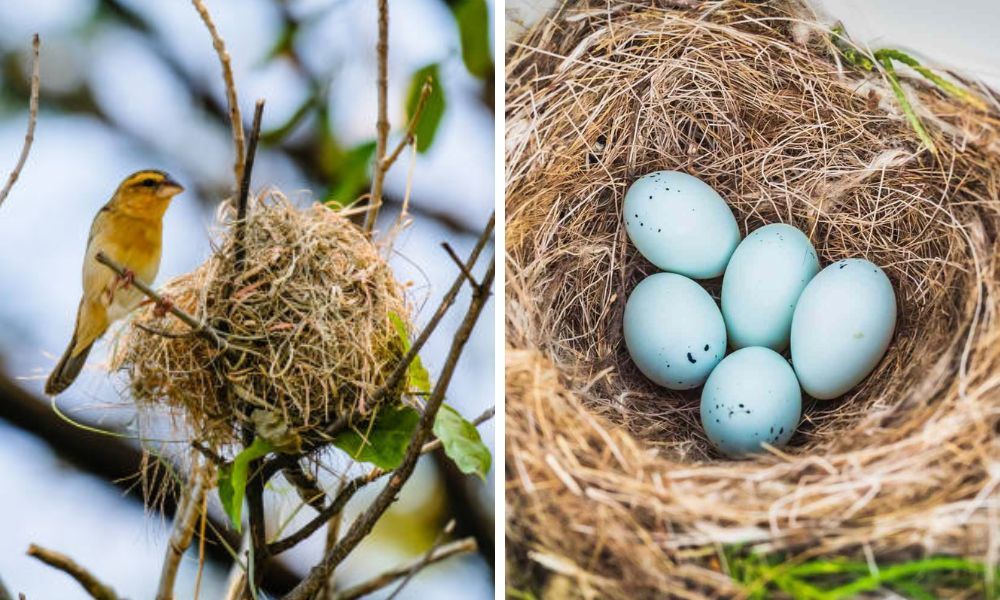
Picture of house finch nest and Picture of house finch eggs. House Finches can be building a nest in this hanging plant.
Nesting Preferences
Different finch species have different nesting preferences. Some prefer to nest in deciduous or coniferous trees, while others may choose hanging planters or rock ledges. House finches are particularly adaptable and can nest in a variety of locations.
Understanding the nesting preferences of your finch species can help you choose the best nest for them. This includes providing the right materials, placement, and maintenance for their nests.
Nesting Behavior
Finches exhibit a variety of nesting behaviors, depending on their species and environment. House finches, for example, are known for their adaptability and can nest in a wide range of locations, from trees to buildings.
Understanding the specific nesting behaviors of your finch species can help you provide the best environment for them. This includes providing the right materials, placement, and maintenance for their nests.
Nesting Sites
Finches can nest in a variety of sites, including deciduous and coniferous trees, hanging planters, and rock ledges. House finches are particularly adaptable and can nest in buildings, feeders, and other man-made structures.
Choosing the right nesting site for your finches is crucial for their health and safety. Ensure that the site is safe from predators and harsh weather conditions, and provide plenty of nesting materials to encourage natural behaviors.
Nesting Materials
Providing a variety of nesting materials, including appropriate nesting material like fiber string and paper towels, is essential for the health and happiness of your finches. Common materials include twigs, leaves, feathers, and string. House finches, for example, often use a combination of twigs and feathers to create a comfortable and secure nest for their young.
You can place these materials in feeders or around your yard to encourage natural nesting behaviors. This not only helps your finches build a sturdy nest but also keeps them engaged and happy.
Nesting Season
The nesting season for finches typically begins in January and can last several months. During this time, finches become more active in courtship and nesting behaviors. Male finches often display vibrant colors and perform elaborate courtship rituals to attract females.
Providing a suitable nesting environment during the nesting season is crucial for the success of your finches. Ensure that there are plenty of nesting materials available and that the nests are placed in safe and secure locations.
Nesting Habits
Finches exhibit a variety of nesting habits, depending on their species and environment. House finches, for example, are known for their adaptability and can nest in a wide range of locations, from trees to buildings.
Understanding the specific nesting habits of your finch species can help you provide the best environment for them. This includes providing the right materials, placement, and maintenance for their nests.
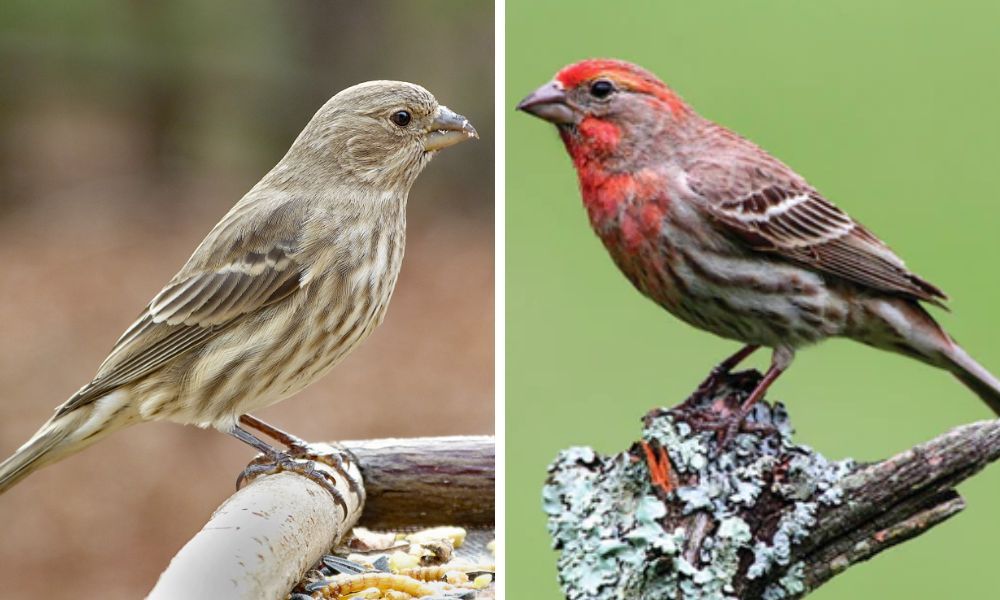
Picture of female house finch and Picture of male house finch
For example: House Sparrows lack stripes; native sparrows all have different patterns, and most are more secretive. Sometimes, Purple Finches building a nest on the eaves of roofs, etc.
Nesting Preferences
Different finch species have different nesting preferences. Some prefer to nest in deciduous or coniferous trees, while others may choose hanging planters or rock ledges. House finches are particularly adaptable and can nest in a variety of locations.
Understanding the nesting preferences of your finch species can help you choose the best nest for them. This includes providing the right materials, placement, and maintenance for their nests.
Nesting Behavior
Finches exhibit a variety of nesting behaviors, depending on their species and environment. House finches, for example, are known for their adaptability and can nest in a wide range of locations, from trees to buildings.
Understanding the specific nesting behaviors of your finch species can help you provide the best environment for them. This includes providing the right materials, placement, and maintenance for their nests.
Nesting Sites
Finches can nest in a variety of sites, including deciduous and coniferous trees, hanging planters, and rock ledges. House finches are particularly adaptable and can nest in buildings, feeders, and other man-made structures.
Choosing the right nesting site for your finches is crucial for their health and safety. Ensure that the site is safe from predators and harsh weather conditions, and provide plenty of nesting materials to encourage natural behaviors.
Providing Food And Water For Finches
Ensuring your finches have a balanced diet and access to fresh water is essential for their health and well-being. Here are some tips for providing food and water for your finches:
- Seed Feeders: Offer seed feeders specifically designed for finches, such as thistle feeders or finch feeders with small perches. These feeders cater to their feeding habits and preferences.
- Fresh Water: Provide fresh water in a shallow dish or birdbath, and change it daily to prevent bacterial growth. Clean water is crucial for their hydration and hygiene.
- Fruits and Berries: Offer fresh fruits and berries, such as sunflower seeds, cherries, and blueberries. These provide essential vitamins and nutrients.
- Insects: Provide insects like mealworms or suet as a protein source. Insects are a natural part of their diet and help in their overall nutrition.
- Nectar Feeders: Offer nectar feeders, such as hummingbird feeders, to provide a source of sugar-water for finches. This can be a supplementary food source, especially during the breeding season.
By following these guidelines, you can ensure that your finches have everything they need to build their nests, stay healthy, and thrive in their environment.
Summary
Choosing the best nest for your finches involves understanding their nesting habits, preferences, and behaviors. By providing the right materials, placement, and maintenance, you can create a safe and comfortable environment for your finches to thrive. Remember to regularly check and clean the nests to ensure the health and happiness of your birds.
FAQ
Q1: What materials should I provide for finch nests?
A1: Common materials include twigs, leaves, feathers, and string. Providing a variety of materials helps finches build sturdy and comfortable nests.
Q2: Where should I place finch nests?
A2: Nests should be placed in safe locations, such as deciduous or coniferous trees, hanging planters, or elevated structures. Ensure the site is protected from predators and harsh weather.
Q3: How often should I check and clean finch nests?
A3: Regularly check nests for damage and remove any abandoned nests to prevent disease. Clean the nesting area and replace old materials with fresh ones to maintain a healthy environment.
At the end...
Choosing the right nest for your finches may seem daunting at first, but following the correct guidelines will ensure you provide your feathered pets with the best possible home to thrive in. Always bear in mind that the right nest size and shape, materials, accessibility, location, and cleanliness are crucial to the health and happiness of your finches. With a comfortable nest, your finches will enjoy their breeding season, and you'll have peace of mind that your feathered friends are happy and healthy.
If you're looking for the best nest to house your finches, your search is over! There is no need to scout around any longer. With just a click of a button below, you can get all the information you need on the top rated nests for finches. A safe, comfortable nesting site is essential for vibrant and healthy finches and you can find one today by following our link. Click the link below now –we guarantee you'll be glad you did!

